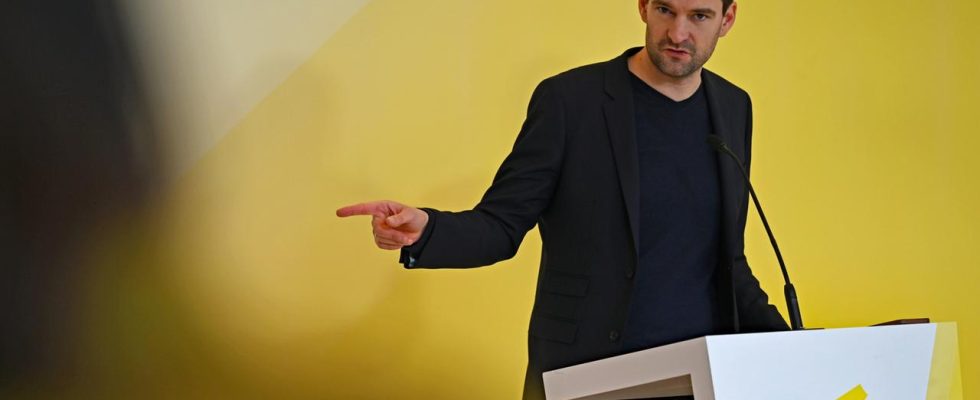Just a few weeks ago, Federal Ministers Heil and Lindner jointly presented plans for a pension reform. But now criticism is coming from the finance minister’s party. Is this a threat of a new traffic light dispute?
Even when the pension package was presented, you could definitely hear the differences. On the one hand, there was a highly satisfied Federal Labor Minister Hubertus Heil. He had ensured that the pension level was permanently stabilized for the SPD. Specifically, this is done by extending the so-called “holding line” of 48 percent, below which the pension of an average employee should not fall, until 2039.
On the other side was Federal Finance Minister Christian Lindner (FDP), who proudly announced the introduction of stock pensions, although not in the version originally planned by his party. Now twelve or more billion euros in debt are taken out every year and then invested on the capital market. The income from this should then contribute to financing the statutory pension from the second half of the 2030s. Nevertheless, contribution rates and state subsidies are increasing significantly. Which is why Lindner added that more needs to be done to secure long-term pensions. “But it is a good, if I may say so, social-liberal compromise that we have found here.”
Clear criticism from economists of pension plans
However, the compromise was not well received at all by business associations and economists. Politicians act in the short term and avoid inconvenient truths in pension policy, complained, for example, Ifo economist Timo Wollmershäuser at the presentation of the joint report in Berlin. Promises are made that it is clear cannot be kept. And policy measures are being sold as a big deal, which it is clear that they really only address the problem very superficially.
A swipe at both the FDP stock pension project and the long-term security of pension levels, which the SPD has taken up. In view of the aging of society, most scientists who deal with the topic of pensions only see the solution as extending working lives, says Wollmershäuser. But politicians don’t dare say that for electoral reasons.
But leading FDP politicians are also dissatisfied with the pension compromise and are calling for improvements. The first thing, according to parliamentary group vice-president Christoph Meyer, is “the political admission of the need for painful decisions about what can still be financed in terms of pensions and what cannot.” The coalition partners SPD and Greens have not yet reached this point, wrote Meyer in a guest article for “Welt”.
FDP is now pushing forward “generational” Pension reform
FDP finance politician Claudia Raffelhüschen also expressed clear criticism of the previous pension plans: A constant pension level, as sought in the government draft, means “that the demographic burden will be borne exclusively by the young and future generations,” she said in an interview with dem ARD capital studio. Raffelhüschen referred to the coalition agreement, which spoke of a “generation-fair solution”. “For me, generational equity means that the same contribution applies across all generations.” The government’s current draft, on the other hand, stipulates that the pension contribution will rise from today’s 18.6 percent to 22.3 percent within ten years.
FDP Vice President Johannes Vogel also recalled the coalition agreement. He does not want to question the “holding line” of 48 percent agreed within the coalition. But securing the pension level must be done in a way that is “generation-appropriate”. And that is what Vogel told the ARD, “not enough in this package.” In order to make the planned pension reform more balanced, the package must be supplemented. Vogel proposes an expansion of stock pensions as well as additional incentives for voluntary overtime in old age. But he could also imagine cutting back on early retirement at 63 – in contrast to the coalition partners SPD and Greens.
At the same time, the FDP politician, who is also the parliamentary manager of his parliamentary group in the Bundestag, emphasized that his move was not an affront to the traffic lights: “There is now an increase of two ministers, which I do not question. But I do question it whether the package is big enough, whether it is brave enough.” This can now be discussed in further political discussions in Berlin, first within the federal government and then in parliament.
Is the next traffic light dispute imminent?
But that has the potential for controversy. Vogel’s request to speak, who initially spoke in an interview with the FAZ, has now been clearly rejected by the SPD. The current pension plans are generation-appropriate, said Katja Mast, Parliamentary Managing Director of the SPD parliamentary group, to the Rheinische Post: “Because this means that young people know that they can rely on their pension later on.” SPD parliamentary group deputy Achim Post warned that the pension package “should not be watered down now”.
Federal Chancellor Olaf Scholz (SPD) had previously made a statement. Against the background of the discussion about the costs of the welfare state in connection with the budget, he said, without explicitly naming the FDP: “One thing is very clear to me, incidentally a basis for the coalition’s agreement, that we will not foresee any deterioration in the area of the welfare state. ” And with this statement, Scholz also expressly referred to the pension package presented by Heil and Lindner.
Hans-Joachim Vieweger, ARD Berlin, tagesschau, March 28, 2024 5:52 p.m

